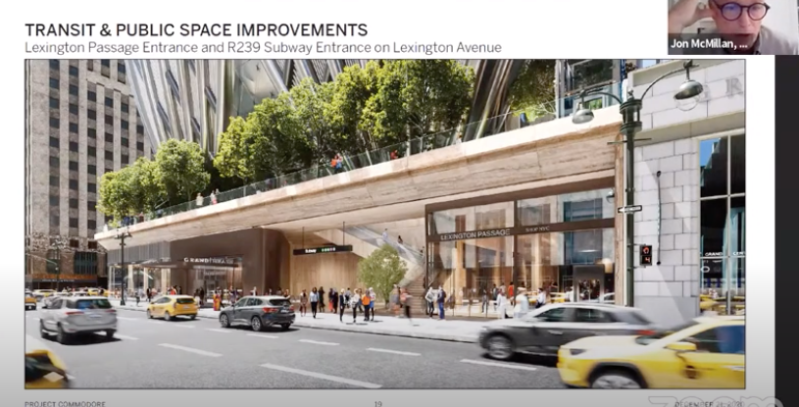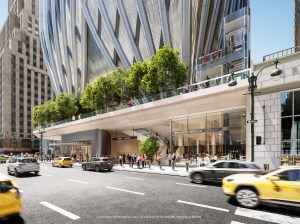Developers Want to Cut Required Bike Parking In Midtown Tower


They’re out of their ride mind.
A development company is under fire for trying to reduce the number of required bike parking spots in its new proposed massive Midtown skyscraper, which would sit on top of one of the busiest transit hubs in the city.
Developers RXR Realty and TF Cornerstone want to build a 1,646-foot mixed-use tower above Grand Central Terminal at E. 42nd Street and Lexington Avenue — dubbed Project Commodore — that would include a 500-room hotel, and retail and office space. Developers say the project, which would take the place of what’s now the 26-story Grand Hyatt, would also benefit the public by providing additional open-air public space, a widened sidewalk on Lexington Avenue, a revamped Lexington Passage and new transit hall, and other mass transit improvements such as new elevators and turnstiles to mitigate congestion inside the popular station.
But in order to break ground, city planners must first approve the developers’ requests for special permits and changes to city zoning laws, including a request to shrink the number of required bike parking spots reserved for commercial tenants of the proposed tower from 286 to 103 — a massive cut sought by the developer given the booming number of cyclists.
“I am concerned about the reduction of the number of bike spots,” said Upper West Sider and longtime advocate Andrew Rosenthal, during a presentation on the project during Community Board 5’s virtual Transportation and Environment committee meeting Monday night, a precursor to the city’s formal land-use review process, which will start next year. “If you build it [bike parking], they will come. Biking is exploding in New York City. This plan doesn’t seem to encompass any of that logic; it doesn’t think about climate change.”
A city zoning law enacted in 2009 requires developers to provide a certain number of enclosed bike parking spaces in new buildings based on their square footage — and under that formula, RXR Realty would be mandated to provide 286 spaces. But the developers claim that roughly 65 percent less bike parking is needed, based on the company’s other buildings.
“We think that makes sense, just given we’re sitting on top of what is probably the largest transportation hub in the city, let alone maybe the country,” said Michael Rem of RXR Realty during the virtual meeting. “We looked across a number of our existing buildings with similar tenants and what we realized was all had bike rooms with about 100 spaces and weren’t fully utilized.”
But the fact that the proposed project is right next to a train station, and at least five subway lines, is even more of a reason to provide bike parking, advocates say.
“It’s shocking to me that bikes are not seen as a method of transportation even for a building built on top of a transit hub, if you really want companies to move to this project,” said Melodie Bryant, a safe-streets activist and member of Transportation Alternatives, during the meeting.

Still, the reduced number of 103 bike parking spots inside the building would be for tenants only — not the general public, who commute to or live in Midtown, where much-needed secure bike parking is already scarce.
And another advocate warned that the developers, who expect to complete construction by 2030, were not looking enough to the future — like by 2100, when experts say whole parts of New York City could be underwater if people do not reduce their carbon footprint, including by choosing to bike instead of drive.
“It’s very shortsighted,” said Andrea Peterson during the meeting. “You need to be more forward thinking about it, make the whole project be more timely.”
The committee voted unanimously, 15-0, to provide members’ comments about the need for bike parking in the board’s overall comments to the Department of City Planning as part of the city’s land-use review process, which will kick off in the spring, according to a spokesman for the developer.
The public may submit written comments to City Planning through Jan. 12, 2021. Comments can be submitted by email to 21DCP057M_DL@planning.nyc.gov or mailed to Olga Abinader at Environmental Assessment and Review Division, New York City Department of City Planning, 120 Broadway, 31st Floor, New York, NY 10271.


